Simple’s guide to intermittent fasting while bodybuilding
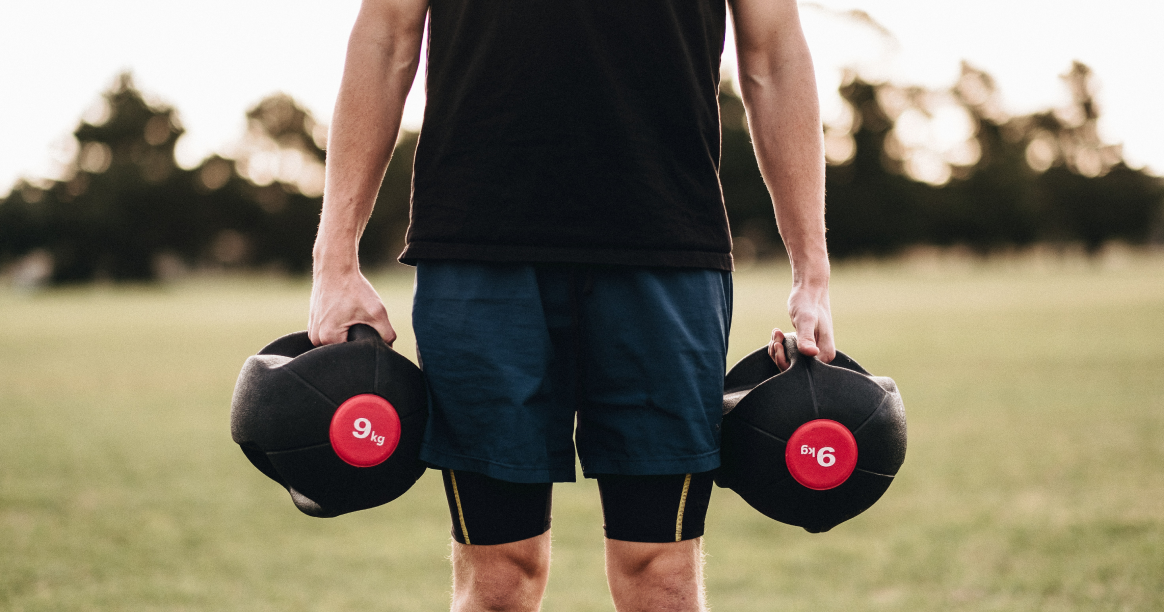
Intermittent fasting gets a lot of credit for being a great tool for weight loss [1] and unlocking health-promoting benefits like reduced inflammation, lower systolic blood pressure, and reduced body fat.[2,3]
But when it comes to shredding and bulking, does it stack up to better gains, or could it stop your deadlift goal in its tracks?

Bodybuilding and intermittent fasting can go together, but whether they will work together to support better muscle mass and strength depends solely on whether intermittent fasting will work for you.
If you’re able to maintain a good training regimen and get enough calories to support your body in building muscle while navigating periods of fasting and maintaining your well-being, intermittent fasting + bodybuilding may equal a buff you.
It’s not safe or effective for everyone, though, so we’re here to run you through everything you need to know about whether intermittent fasting could be the “hyper” in your “hypertrophy” goals or the “liftoff” to your bodybuilding experience.
(Fingers crossed all our bodybuilding puns snatch your interest along the way, too … )
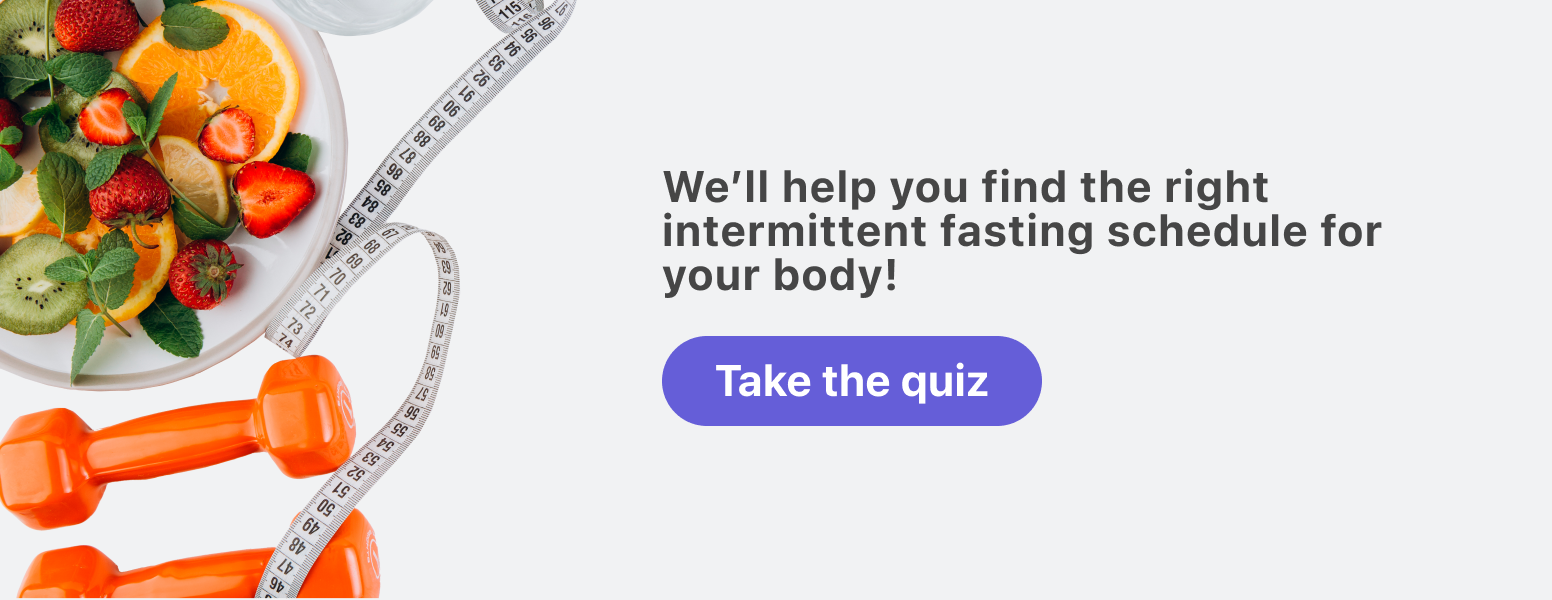
Do intermittent fasting and bodybuilding fit together?
Fasting and bodybuilding can go together like strength training and muscle gain: if it’s done safely and in the right way, the former may support your goals in the latter.
Intermittent fasting may lead to benefits that directly and indirectly affect your ability to shred fat and build muscle, including:
- increasing your resting metabolic rate and ability to oxidize fat (which help with body fat burning);[4,5]
- reducing oxidative stress (which may promote cellular repair, or autophagy, that supports muscle recovery);[6,7] and
- retaining muscle mass when combined with resistance training.[8]
In the short term, intermittent fasting may also boost growth hormone secretion (which is linked to muscle mass and strength [9]),[10] but there’s not much research on the subject, and existing results are pretty mixed.
However, intermittent fasting for bodybuilders can be tricky because to support muscle growth, you ideally need to eat an excess of calories — and intermittent fasting generally promotes a calorie deficit since you’re eating over a shorter period of time. Likewise, you’ll need a very good workout schedule that combines both cardio and resistance training — which can be tough to manage around more confined eating windows.
Plus, bodybuilding goal considerations aside, intermittent fasting isn’t safe or right for everybody. We always recommend speaking with your primary care provider before making any changes to your diet or exercise program, but you should be particularly cautious and avoid intermittent fasting if you:
- are pregnant, breastfeeding, or trying to conceive;
- have a history of or are currently diagnosed with disordered eating;
- are living with any type of diabetes or other medical condition, especially those that impact the pancreas, liver, thyroid, or gallbladder;
- are underweight (your BMI is less than 18.5);
- are under the age of 18, or 80 years old or more; or
- are prescribed medication (for example, anti-hypertensives, diabetes medications, or any that need to be taken with food).
Cleared to try fasting? We’re here to be your spotter, personal trainer, life coach, and cheerleader all in one. Take our Simple quiz, and we’ll help you find the right intermittent fasting schedule for your body, give you the tools to keep your form on point, and support you through any sticking points. You can also check out our intermittent fasting for beginners guide to get up to speed with the basics.
How does intermittent fasting help muscle growth
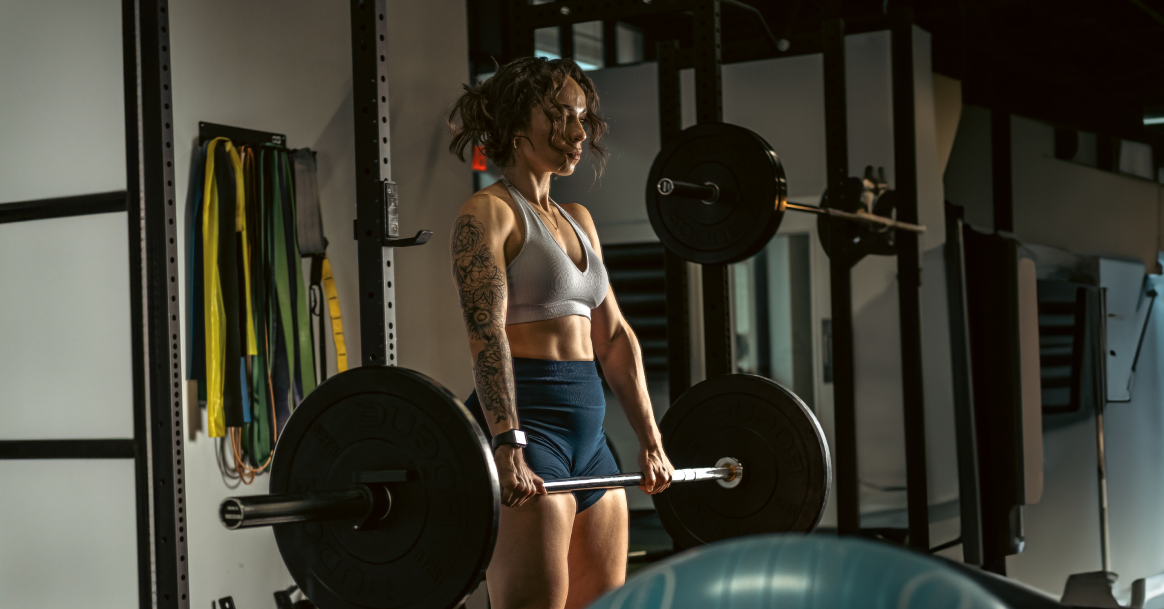
If you’re considering fasting for bodybuilding, you’re probably wondering if intermittent fasting can help you get swole like your favorite action hero or jacked like your favorite superhero.
While it may not be the most obvious choice for building muscle mass, intermittent fasting and bulking can go hand in hand if you eat enough calories (ideally more than you burn), have enough protein to build new muscle tissue, and do sufficient exercise to stimulate muscle growth. We explain all about it in our guide to intermittent fasting for muscle gain.
Although there isn’t a huge amount of research on intermittent fasting for bodybuilders specifically, there are a lot of science-backed ways intermittent fasting can support muscle growth.
Boosts fat loss while preserving lean muscle
Helpful for the cutting phase especially, intermittent fasting has been linked to fat mass loss and preserving existing resistance-trained lean muscle.[11,12]
Supports muscle strength and mass
Short-term intermittent fasting (8 weeks) combined with resistance training has been associated with increased muscular strength and endurance as well as skeletal muscle hypertrophy.[12,13]
Improves insulin resistance
Intermittent fasting has been associated with better insulin sensitivity.[14] Insulin resistance has been connected to body fat accumulation and accelerated muscle deterioration.[15]
Reduces inflammation
Inflammation can affect muscle strength / mass and lead to muscle loss.[16,17] The good news is that intermittent fasting can reduce inflammation and related cardiometabolic risk factors.[18]
Doesn’t limit protein intake
Protein is an essential nutrient for building muscle, and intermittent fasting only affects when you eat rather than what you eat [19] — so you can pack that lean protein in as much as you need during your eating windows.
Intermittent fasting drawbacks for bodybuilders
Although bulking while intermittent fasting is entirely possible if intermittent fasting works for your body and lifestyle, it’s not always a clean lift. If you’re looking to combine bodybuilding + intermittent fasting, there are a few potential hurdles you could face.
It’s hard(er) to hit daily macros for bulking
Bulking normally requires a caloric surplus, so ideally, bodybuilders want to eat more than they burn to grow muscle — and it may be challenging to fit more calories into a shorter eating timeframe. It is possible, though, to build muscle mass in a caloric deficit if you eat enough protein.[20] Typically bodybuilders need at least 25–30 g of protein (with a minimum 15 g of carbs) every few hours in the day (the equivalent of one 4 oz. chicken breast and one slice of bread), so especially if you might end up in a calorie deficit while fasting, you’ll need to be extra diligent about upping your protein intake during your eating windows to sustain the protein synthesis (and gobble up all the amino acids) necessary for muscle growth. Some bodybuilders may also succeed in building muscle on keto and intermittent fasting.
Working out fasted may be difficult
Fasting restricts energy, and you need energy for physical activity, especially the level and intensity associated with bodybuilding. To ensure you’re approaching your fitness goals in a safe, sustainable way, you may need to reconsider when you work out (usually an hour or two after eating a protein- and carb-rich meal) and your pre-workout (and post-workout) nutrition needs.
You may still gain fat
Gaining body fat is still possible with intermittent fasting if you aren’t eating health-promoting, nutrient-dense foods. To maximize strength building while minimizing fat gain, bodybuilders want to limit foods that are ultra-processed, high in refined carbs, and high in trans fat (such as chips, chicken nuggets, and cookies).
Which intermittent fasting schedule is best for bodybuilding?
Whether you’re thinking about intermittent fasting while bulking or intermittent fasting for cutting, any approach to fasting and bodybuilding has one thing in common: you.
What’s successful and safe for you may not be the same for someone else, so there’s no concrete answer to what fasting schedule is best for bodybuilding.
Think of it like this: You’re starting your very first day of weightlifting. Would it go well if you hit the gym and jumped straight into heavy weight sets with lots of reps? Now imagine you’ve been lifting regularly for a year. Would a training plan that involves a few reps with 1 lb. weights do much for you?
While intermittent fasting 16:8 — which involves a 16-hour fast and an 8-hour eating window — is often recommended as a bodybuilder’s best bet (because it’s part of the “Leangains” method pioneered by Swedish powerlifter Martin Berkhan and it’s a daily plan that gives you a decent amount of time to pack in calories and protein), it may not be a great fit for everyone.
For instance, it may work well if you like a couple of large meals, but if you prefer lots of smaller ones, maybe you’re better off with a 12-hour intermittent fasting schedule so you have munching time. Or if you don’t like the idea of fasting every day, maybe the 5:2 diet — where you eat as you normally would for five days of the week and fast for the other two — is a better match.
As a general rule, we recommend avoiding longer fasts (18+ hours), as they’re not always safe without medical supervision. For bodybuilding in particular, you probably wouldn’t want to fast longer than 16 hours, or you might risk not having enough fuel for successful muscle growth and endurance training.
Bottom line:
Whatever works for you, your body, and your bodybuilding goals — and whatever you can stick to comfortably — is the best fasting + bodybuilding combo.
That said, if you’re training to be a bodybuilding pro, you should probably avoid intermittent fasting altogether since you need to eat every 2–4 hours to avoid muscle loss.
How long should bodybuilders practice intermittent fasting?
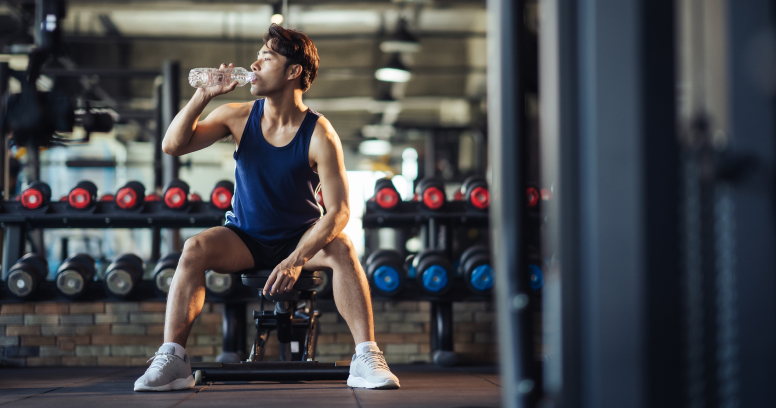
As with how you should intermittent fast for bodybuilding, how long you should mix bodybuilding and fasting depends on you and your goals.
Maybe you’re aiming for a pre-competition cut. In that case, a short-term fast for a couple weeks or one week of alternate day fasting for bodybuilding might do the trick.
Or maybe you’re looking to revamp your training approach and want to see if it’s compatible with intermittent fasting. Then you might want to test the waters slowly; keep an eye out for intermittent fasting side effects and ease your way into the new routine over a few months.
There’s no “one size fits all” program for fasting and bodybuilders, and longer isn’t necessarily better. Unlike when you’re building muscle, overloading isn’t going to do any good here: If you’ve hit an “intermittent fasting not working” plateau, it’s not a good idea to force it.
We know it’s frustrating not having a clear-cut plan to follow, and that’s where we can help. If you’ve gotten the green light from your healthcare provider to try fasting, take our Simple quiz to learn more about your options and explore what plan(s) may support you in reaching your bodybuilding peak.
Is it ok to work out fasted?
Intermittent fasting and working out can totally work in tandem for the benefit of your bodybuilding goals. While you definitely don’t want to overdo it on physical activity and underdo it on fuel intake — which impedes muscle growth and can lead to injury or illness — you can pair fasting and exercise in a safe, smart, and sustainable way. The key is to tailor the workout type, level, and length to your goals, needs, and well-being.
For safe workouts and muscle-building best practice, you should:
- Follow a training plan that combines a good level of cardio and resistance training.
- Schedule workouts for an hour or two after eating a meal that’s rich in both protein and carbs.
- Build in recovery time (and if you’re not fasting every day, maybe overlap those recovery days with your fasting days).
- Keep dehydration at bay with lots of water and some electrolytes (like unsweetened coconut water).
How often should bodybuilders do intermittent fasting?
If we’ve warmed you up properly, you probably already know what’s coming: Much like how you intermittent fast and how long you practice intermittent fasting, how often you fast depends on — drumroll, please! — you.
There’s no universal magic number of reps that unlocks better bodybuilding results, so how often you fast and how hard you go depends on what’s safe for your body and what’s most likely to help you achieve your goals.
That said, if you’re fasting for bodybuilding, you probably don’t want to do it every day indefinitely, or you’ll spend a lot of time and energy navigating those potential hurdles of drawbacks we mentioned earlier. A few days a week — with adequate protein and carb-cycling, especially on workout days — may be plenty.[21]
No matter your reasons for fasting, we always recommend easing into the process. Bodybuilding may involve “training to failure,” but intermittent fasting is all about “training for success.”
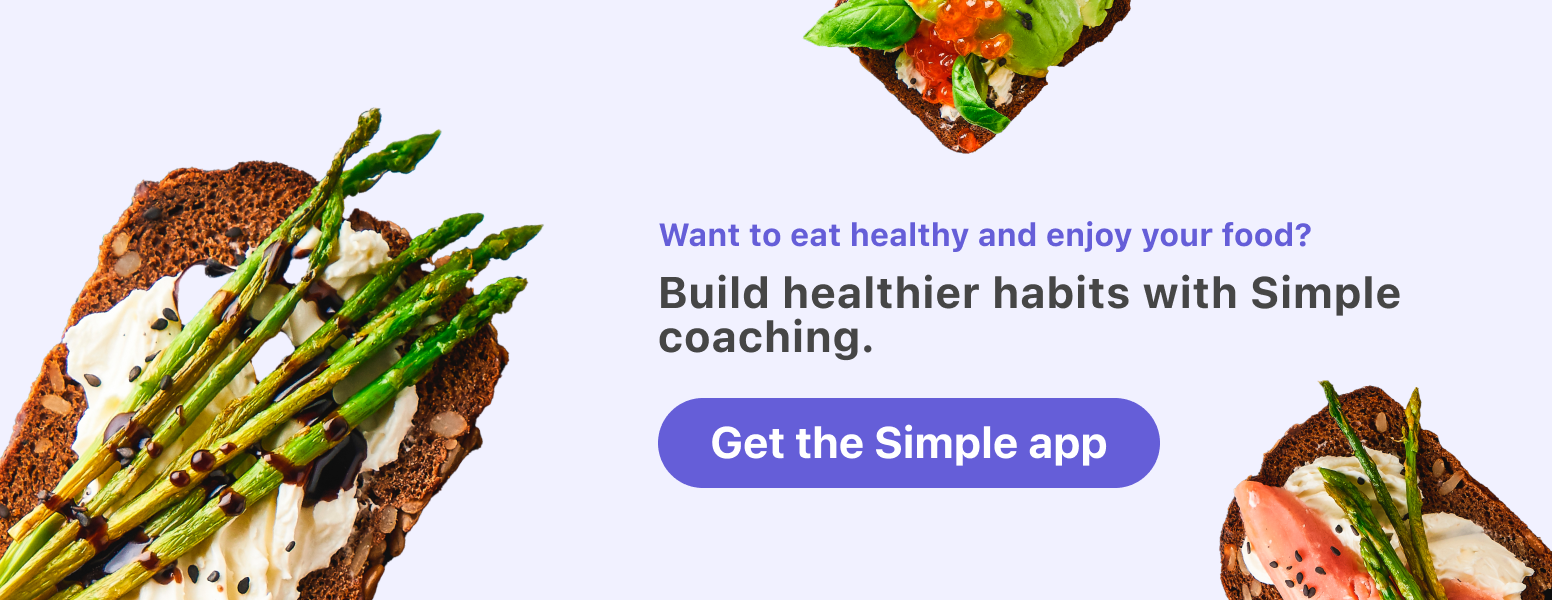
When should bodybuilders utilize intermittent fasting?
Since how, how long, and how often you fast is down to you and your needs, you better believe you also dictate the “when” of the experience.
If intermittent fasting is a good fit for your body and routine, you can, in theory, fast at any time — but there are a few occasions when a bodybuilder fast may be especially beneficial to your training goals.
For a trim down
Since intermittent fasting can be helpful in fat mass loss, it can be useful if you’re looking to drop some body fat without muscle mass in the process.[22]
For a cutting cycle
Whether it’s pre-competition time or you just want a cutting edge, intermittent fasting — especially a 16:8 schedule — can supercharge your approach since it gives you the eating routine leeway you need to hit your daily caloric / macro needs while still promoting positive metabolic changes (like potentially increasing your metabolism and your resting metabolic rate [23,24]).[25]
For a rest day
Aligning your fasting days with your rest days means you can tap into all the fasting benefits without having to navigate the extra step of balancing workouts, calorie intake, and fasting windows.
Intermittent fasting tips for bodybuilders
At Simple, we firmly believe the best intermittent fasting schedule is one that aligns with you and your needs, goals, preferences, and lifestyle, and one of the most common intermittent fasting mistakes we see is trying to force an approach that doesn’t match.
While the specifics of every intermittent fasting experience will vary from person to person, there are a few things anyone can try to optimize their bodybuilder fasting journey.
- Identify the right calorie targets. Speak with your doctor / dietitian (or try our calorie calculator) to figure out what targets you need to hit for safe muscle gain and fat loss.
- Schedule workouts according to your goals. To maximize muscle gain and workout energy, lift weights and do any higher-intensity cardio during eating windows. To burn body fat, work out a couple of hours before eating.
- Keep an eye on your macros. To build muscle mass and strength safely, you need to get enough calories, specifically from protein and carbohydrates. Prioritizing lean protein (like chicken, turkey, beans, and lentils) and other high-protein foods (like eggs, fish, and dairy products) is especially important. Try our macro calculator to keep tabs on your macros.
- Focus on nutrient-dense foods. Limiting foods that are ultra-processed, high in refined carbs, or high in saturated / trans fat and instead filling up with foods like fruits, vegetables, whole grains, healthy fats, and nuts / seeds will ensure you’re getting the best kind of fuel for gaining strength not fat.
- Build in recovery time. Just like you’d never want a training routine that runs you into the ground, you don’t want a fasting schedule that makes you miserable. Whether you have a day each week where you’re neither training nor fasting, or you have certain days where your eating routine has more wiggle room, make sure you’re not weighed down by a bunch of rules and restrictions. (Just because you’re strong enough doesn’t mean you have to shoulder them!)
Simple’s intermittent fasting meal plan for bodybuilders
One of the best things about intermittent fasting is that it’s all about when you eat rather than what you eat. But how does that freedom actually translate to menu planning, especially when you have a specific goal like bodybuilding — and specific caloric / macro needs — in mind?
Here’s a sample “fasting for bodybuilders” meal plan you can try if you’re testing out a 16:8 schedule for a few days.
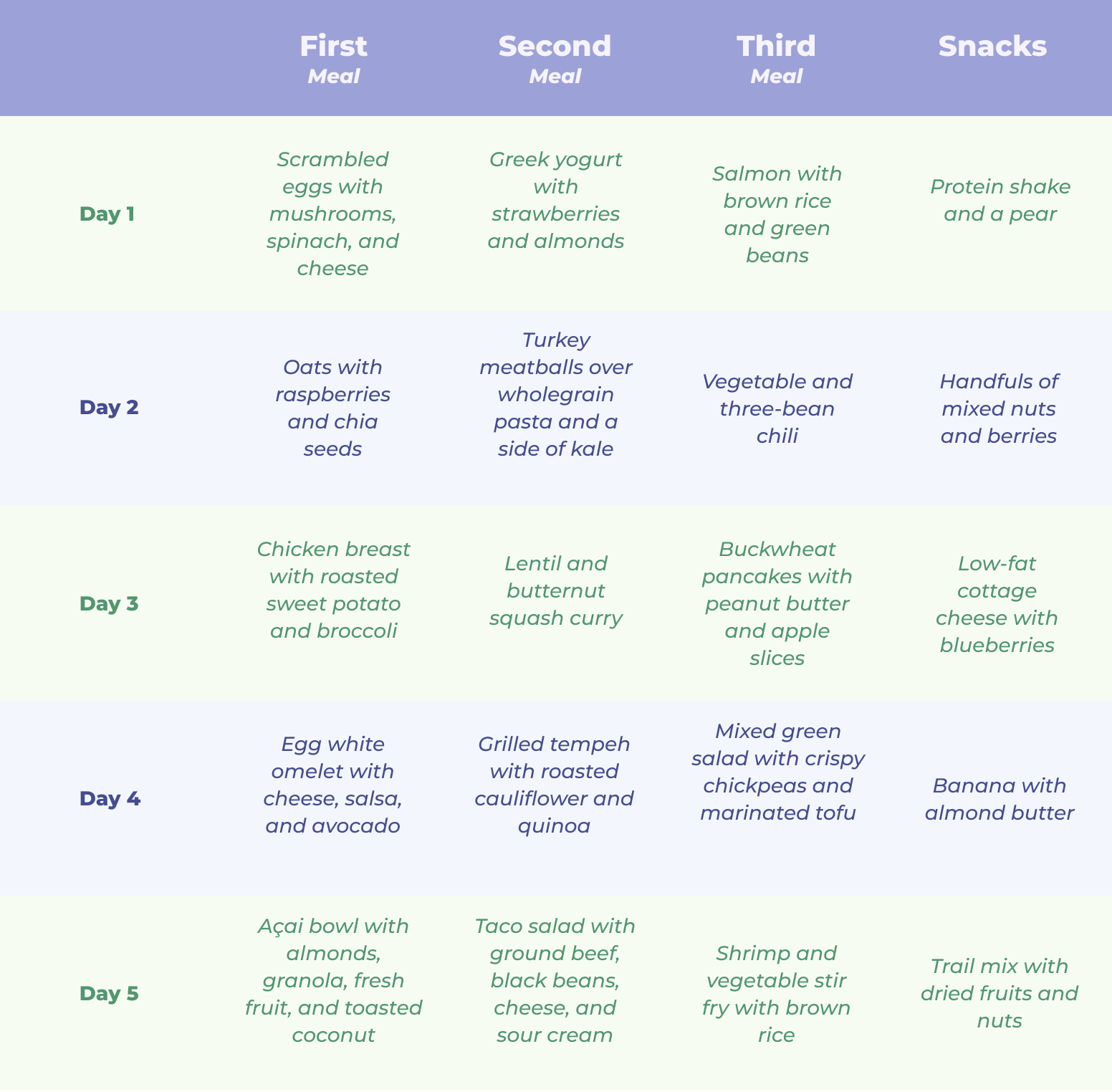
Looking for more ideas on what to eat during intermittent fasting? You can also get some recipe inspo from our general intermittent fasting 16:8 meal plan!
It’s unclear if intermittent fasting increases testosterone. Some research suggests fasting affects assigned-at-birth men and women differently because of how it impacts reproductive hormones,[26] and some research suggests fasting may lower testosterone levels in men (but not to the detriment of muscle loss).[12]
While everyone responds to fasting differently, 20 hours is usually enough to induce autophagy (we say it usually requires at least 14–16 hours). We don’t recommend fasting for more than 18 hours without medical supervision, though.
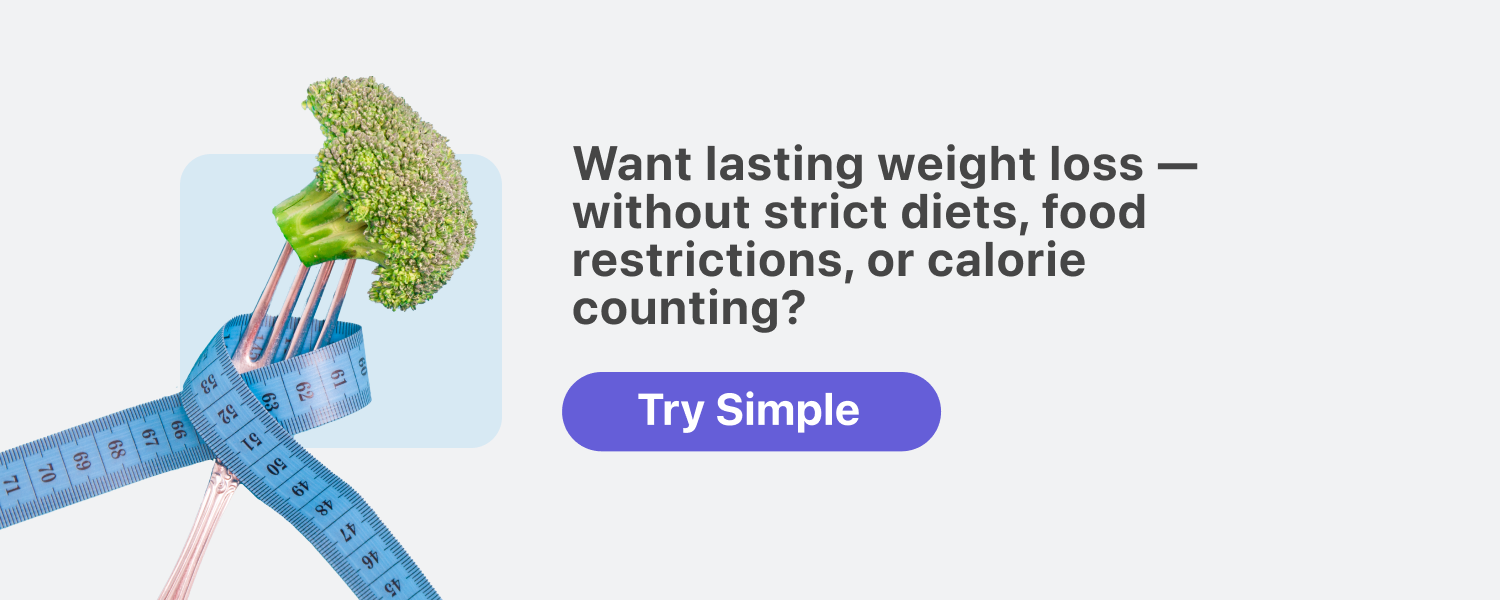
- Wei X, Cooper A, Lee I, Cernoch CA, Huntoon G, Hodek B, et al. Intermittent Energy Restriction for Weight Loss: A Systematic Review of Cardiometabolic, Inflammatory and Appetite Outcomes. Biol Res Nurs. 2022 Jul;24(3):410–28.
- Wang X, Yang Q, Liao Q, Li M, Zhang P, Santos HO, et al. Effects of intermittent fasting diets on plasma concentrations of inflammatory biomarkers: A systematic review and meta-analysis of randomized controlled trials. Nutrition. 2020 Aug 12;79-80:110974.
- Patikorn C, Roubal K, Veettil SK, Chandran V, Pham T, Lee YY, et al. Intermittent Fasting and Obesity-Related Health Outcomes: An Umbrella Review of Meta-analyses of Randomized Clinical Trials. JAMA Netw Open. 2021 Dec 1;4(12):e2139558.
- Zauner C, Schneeweiss B, Kranz A, Madl C, Ratheiser K, Kramer L, et al. Resting energy expenditure in short-term starvation is increased as a result of an increase in serum norepinephrine. Am J Clin Nutr. 2000 Jun;71(6):1511–5.
- Chiu CH, Chen CH, Wu MH, Lan PT, Hsieh YC, Lin ZY, et al. 5 days of time-restricted feeding increases fat oxidation rate but not affect postprandial lipemia: a crossover trial. Sci Rep. 2022 Jun 3;12(1):9295.
- Johnson JB, Summer W, Cutler RG, Martin B, Hyun DH, Dixit VD, et al. Alternate day calorie restriction improves clinical findings and reduces markers of oxidative stress and inflammation in overweight adults with moderate asthma. Free Radic Biol Med. 2007 Mar 1;42(5):665–74.
- Call JA, Nichenko AS. Autophagy: an essential but limited cellular process for timely skeletal muscle recovery from injury. Autophagy. 2020 Jul;16(7):1344–7.
- Keenan S, Cooke MB, Belski R. The Effects of Intermittent Fasting Combined with Resistance Training on Lean Body Mass: A Systematic Review of Human Studies. Nutrients [Internet]. 2020 Aug 6;12(8).
- Chikani V, Ho KKY. Action of GH on skeletal muscle function: molecular and metabolic mechanisms. J Mol Endocrinol. 2014 Feb;52(1):R107–23.
- Ho KY, Veldhuis JD, Johnson ML, Furlanetto R, Evans WS, Alberti KG, et al. Fasting enhances growth hormone secretion and amplifies the complex rhythms of growth hormone secretion in man. J Clin Invest. 1988 Apr;81(4):968–75.
- Varady KA. Intermittent versus daily calorie restriction: which diet regimen is more effective for weight loss? Obes Rev. 2011 Jul;12(7):e593–601.
- Moro T, Tinsley G, Bianco A, Marcolin G, Pacelli QF, Battaglia G, et al. Effects of eight weeks of time-restricted feeding (16:8) on basal metabolism, maximal strength, body composition, inflammation, and cardiovascular risk factors in resistance-trained males. J Transl Med. 2016 Oct 13;14(1):290.
- Tinsley GM, Moore ML, Graybeal AJ, Paoli A, Kim Y, Gonzales JU, et al. Time-restricted feeding plus resistance training in active females: a randomized trial. Am J Clin Nutr. 2019 Sep 1;110(3):628–40.
- Cho Y, Hong N, Kim KW, Cho SJ, Lee M, Lee YH, et al. The Effectiveness of Intermittent Fasting to Reduce Body Mass Index and Glucose Metabolism: A Systematic Review and Meta-Analysis. J Clin Med Res [Internet]. 2019 Oct 9;8(10).
- Wang X, Hu Z, Hu J, Du J, Mitch WE. Insulin resistance accelerates muscle protein degradation: Activation of the ubiquitin-proteasome pathway by defects in muscle cell signaling. Endocrinology. 2006 Sep;147(9):4160–8.
- Tuttle CSL, Thang LAN, Maier AB. Markers of inflammation and their association with muscle strength and mass: A systematic review and meta-analysis. Ageing Res Rev. 2020 Dec;64:101185.
- Ji Y, Li M, Chang M, Liu R, Qiu J, Wang K, et al. Inflammation: Roles in Skeletal Muscle Atrophy. Antioxidants (Basel) [Internet]. 2022 Aug 29;11(9).
- Moro T, Tinsley G, Pacelli FQ, Marcolin G, Bianco A, Paoli A. Twelve Months of Time-restricted Eating and Resistance Training Improves Inflammatory Markers and Cardiometabolic Risk Factors. Med Sci Sports Exerc. 2021 Dec 1;53(12):2577–85.
- Schiaffino S, Dyar KA, Ciciliot S, Blaauw B, Sandri M. Mechanisms regulating skeletal muscle growth and atrophy. FEBS J. 2013 Sep;280(17):4294–314.
- Pasiakos SM, Cao JJ, Margolis LM, Sauter ER, Whigham LD, McClung JP, et al. Effects of high-protein diets on fat-free mass and muscle protein synthesis following weight loss: a randomized controlled trial. FASEB J. 2013 Sep;27(9):3837–47.
- Coyle EF. Timing and method of increased carbohydrate intake to cope with heavy training, competition and recovery. J Sports Sci. 1991 Summer;9 Spec No:29–51; discussion 51–2.
- Redman LM, Ravussin E. Caloric restriction in humans: impact on physiological, psychological, and behavioral outcomes. Antioxid Redox Signal. 2011 Jan 15;14(2):275–87.
- Webber J, Macdonald IA. The cardiovascular, metabolic and hormonal changes accompanying acute starvation in men and women. Br J Nutr. 1994 Mar;71(3):437–47.
- Stover S, Smith M, Edwards A, Gateless K, Bolyard C. The impact of intermittent fasting and exercise on resting metabolic rate and respiratory quotient. J Exerc Physiol Online. 2019 Dec 1;22(7):22–9.
- Patterson RE, Sears DD. Metabolic Effects of Intermittent Fasting. Annu Rev Nutr. 2017 Aug 21;37:371–93.
- Cienfuegos S, Corapi S, Gabel K, Ezpeleta M, Kalam F, Lin S, et al. Effect of Intermittent Fasting on Reproductive Hormone Levels in Females and Males: A Review of Human Trials. Nutrients [Internet]. 2022 Jun 3;14(11).
